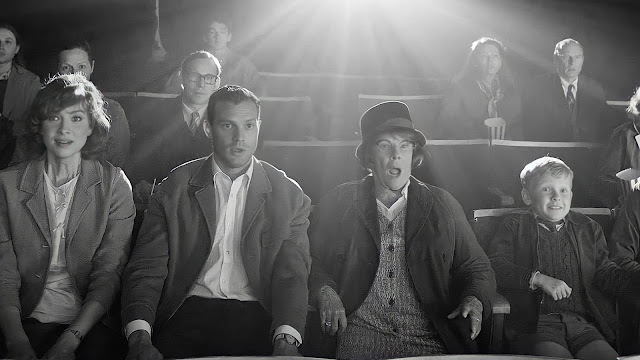Belfast: Blu Ray Review
It's hard to know if Kenneth Branagh's nostalgia-tinged ripped-from-my-childhood Belfast is such a simplistic film because it's supposed to be viewed through the eyes of a child, or because there is little depth in its script, which is set against the backdrop of the Cathotic and Protestant troubles in 1960s Ireland.
Fortunately, Branagh's black and white tinged view of things is sumptuous enough on the eyes - even if its nourishment is lacking for the soul.
Newcomer Jude Hill plays Buddy, whose world is fighting with bin lids and make-believe swords and whose nights are filled with the first series of Star Trek and High Noon, as well as trips to the local cinema.
Buddy lives in a world of innocence and naivete but is treading tenderly into reality with catching snatched conversations of financial tensions between his ma and pa (Balfe, the solid performer of the film and Dornan, watchable but unspectacular) and facing the reality of his beloved Pop (Ciaran Hinds) having to go into hospital for issues with his lungs.
Against the barricades going up in Belfast, Buddy lives day to day - whether it's trying to get the attention of a girl in his class, or being involved in scrapes that he initially doesn't want to be part of.
Belfast feels like a cross between Roma, Moone Boy and Derry Girls, albeit one that's being lovingly fused together with the hue of nostalgia. But its execution feels piecemeal, and seems to be more about capturing a feeling and atmosphere of being a child in a turbulent time, rather than the drama of being caught in the whirlwind.
Belfast does little to transcend the usual coming-of-age tropes, but a slickly shot sheen helps to sell it as something a bit different (even if it's stuffed with excessive Van Morrison-laden syrupy montages) and gives it the hue it's aiming for.
While Hill is round-cheeked and wide-eyed enough to rank up there with Martin Moone, Belfast belongs solely to Outlander's Caitriona Balfe who leads from the front, even when the subtlety is distinctly lacking. Fused with charisma, heart and honesty, it's Balfe that makes the film work - and sells some of the improbabilities. (Such as marching the kids back into the middle of a riot and shoplifting spree to return goods.)
But it's in the intentions that Belfast seems a bit lost.
It may open with colourful cloud-level vistas of the city now, before peeking over a wall and then lapsing into the past (a bravura directorial moment), but Branagh's film follows most of the conventions and avoids the darkness of the Troubles in the city. It's high on sentiment and intent, rather than execution and while it's winningly filled with comedic moments, and blasts of the past, it's nothing more than a crowd-pleasing blanket of comfort feeling that audiences will be left with.





%20&%20Edith%20Poor%20(Lizzie%20Moyle)_%C2%A9BBCS%20&%20Bunya%20Entertainment.jpg)
No comments:
Post a Comment